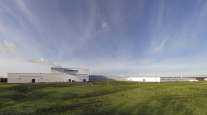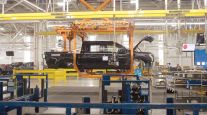Component Shortages Grow; OEMs Report Supply Problems
This story appears in the Aug. 1 print edition of Transport Topics.
Shortages of components for new heavy-duty trucks are growing, leading vehicle manufacturers to cut back their sales forecasts as their backlog of truck orders continues to mount, executives said.
Mark Pigott, chairman and CEO of Paccar Inc., said last week that supply problems had hit his company and those of his competitors. Paccar builds Peterbilt and Kenworth trucks.
“We have lowered our industry retail sales forecast range in North America due to the uneven economic conditions and supplier capacity constraints, specifically tires and chassis components,” Pigott said July 26 in a conference call with stock analysts.
Other manufacturers acknowledged supply problems of varying degrees, but all denied Pigott’s assertion that components shortages had fostered prolonged assembly-line shutdowns.
Pigott, in a transcript of his remarks obtained from Bloomberg News, said that a “host of suppliers” were causing problems, not just one or two of them.
“As you know . . . you need them all to make a truck to be able to deliver to a customer,” Pigott said. “Certainly, a number of our competitors . . . had weeklong shutdowns. I can think of one or two [that] have shutdowns right now because of supplier issues, and we’re seeing this more in North America.”
However, all other OEMs denied they had invoked total shutdowns.
“Like others in our industry, we have experienced some sporadic supply issues, but nothing that has caused any protracted or weeklong shutdowns,” Jack Allen, president of North American truck operations for Navistar Inc., told Transport Topics. Navistar builds International trucks.
Roger Nielsen, chief operating officer of Daimler Trucks North America, builder of Freightliner and Western Star vehicles, denied any shutdowns at Daimler’s plants.
Spokesmen for Mack Trucks Inc. and Volvo Trucks North America said their plants shut down every summer for two weeks, but that it had nothing to do with a parts shortage.
“Our 2011 shutdown, which ended Sunday, July 10, was not due to a component shortage,” Volvo spokes-man Brandon Borgna told TT.
“Every year, employees take two weeks of vacation in the summer, and we use this period for project work in the plant that can’t be accomplished with production up and running.” Mack spokesman John Walsh told TT. “It’s not the result of a supply issue.”
Nevertheless, components shortages have had an effect on production. “We have had some disruptions, but production has not been completely shut down,” Walsh said.
Ron Huibers, Volvo Trucks’ senior vice president of sales and marketing, said that, although Volvo “ramped up” production ahead of the industry, “we have experienced some frustrating delays as a result of the great demands we, and the rest of the industry, have been placing on suppliers.”
Kevin Flaherty, senior vice president at Mack Trucks Inc., also said suppliers had trouble keeping up.
“Whenever demand soars, as it has this year, the question becomes whether truck manufacturers and suppliers can keep pace with the market,” Flaherty told TT.
“We’ve placed a lot of pressure on suppliers who, despite some delays, have done a good job of managing demand by adjusting their own production activities,” he said.
Daimler’s Nielsen said its supplier problems have been minor, and he told TT, “We work closely with our suppliers and have experienced no plant shutdowns due to parts shortages.”
“With over 1,000 component suppliers in the U.S. and around the globe, there are only a handful requiring DTNA assistance and oversight to avoid production-line stoppages and significant delivery delays,” Nielsen said. “Expedited shipments, by air or by ground express, are higher than normal, but that is to be expected.”
Timothy Kraus, president of the Heavy Duty Manufacturers Association, said some suppliers were having problems meeting demand.
“Certain members are having difficulty with demand that is related to demand increases that exceed their current manufacturing plant capacity,” Kraus told TT. “This is mainly due to ramp-up issues with skilled labor.”
The parts shortages could “be anything to do with the rear suspension area,” Pigott said. “It can be an axle-related type of components. It could be components inside the cab that we might be purchasing.”
Meanwhile, market research firm ACT Research Inc. said that the Class 8 build backlog totaled 126,207 units at the end of June, a 141.9% increase from June 2010. The backlog has built up from eight straight months of orders that surpassed 20,000 units, hitting about 38,000 in April (7-11, p. 1).
Because of heavy demand for new trucks, OEMs said they were increasing production but may not be able to fill all the orders they’ve received this year.
“Backlogs are increasing, certainly, throughout the industry, and at Kenworth, Peterbilt . . . which is good. But I think there might be an element of push-out” to 2012, Pigott said.
Volvo’s Huibers said that “as the order rate rises, it’s only natural that we’ll eventually reach a ‘ceiling’ regarding the number of trucks [factories] can physically build in a year.”




